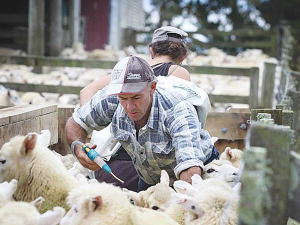Drenching routines are well underway for many lamb finishers.
However, it is important to know the efficacy of the drenches used and to take a whole farm management approach to internal parasite management.
Beef + Lamb New Zealand’s senior advisor animal welfare and biosecurity Will Halliday says a ‘Drench Check’ (Faecal Egg Counts (FECs) carried out 7- 12 days after drenching) will give an indication of the efficacy of the drench they’ve used and/or their drenching technique.
If there are still eggs present, and problems with drenching technique such as a faulty gun can be eliminated, then a FEC Reduction Test will be required to determine what drench families are still effective on their property.
Halliday says a lot of farmers still don’t know the drench status of their farms.
He adds that using ineffective drenches are not only a waste of money, but they are also not good for the longterm sustainability of the farm.
“Managing internal parasites is not as simple as just drenching lambs every 28 to 30 days, you need to look at the whole farm management.”
These tools include using breeding, refugia, regular monitoring and the use of forage crops as part of a total management package.
He says that every farm and situation is different and variables such as the mix of livestock classes, irrigation, grazing management and seasonal variations will all influence the shape of an internal parasite management programme.
Get Worm Wise
Wormwise is the national worm management strategy – which aims to help farmers and their advisors to manage worms sustainably.
It brings together industry experts to manage and integrate research work, education, communication and extension services for the benefit of farmers, veterinarians, key influencers and retailers.
For more information go to: www.wormwise.co.nz



















